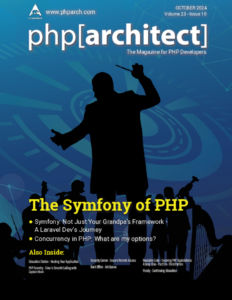We’ve been working on an API client and making decent progress while we discover new tools that we can use to improve our development work. If you’ve been following along, you may be asking why it seems we’ve made so little progress in implementing all the functionality available for the API. This month, we look at the progress to date and explain why we’re working at a slower pace. Finally, we will check out (no pun intended) how to use Git hooks to enforce project standards and norms. by Oscar Merida
We’re on our final stage of Securing PHP Applications: Dealing with third parties. by Christopher Miller
The Back Office building blocks (Command, Job, Model, table) use Laravel Jobs, which, in turn, use queue request tables. Here, we are setting up a minimal configuration with Liquibase table management, queue request table, Laravel job, and Laravel Command to dispatch that job. We explicitly use a “boilerplate” approach that allows you to quickly focus on what’s specific to the job/process in question. Finally, we show the “dispatch self” technique, allowing the job to iterate through extended input. by Edward Barnard
As I write this, I have just presented at CascadiaPHP in Portland, Oregon, which made me reflect… by John Congdon
2025 will mark 30 years of PHP. PHP has watched the technological landscape change in ways that many of us would not have expected. One of the biggest shifts has been how PHP applications can be hosted. When I started web development, I had to shuffle files around with FTP. My first corporate job involved hosting a website on a repurposed Dell tower server in a “server room”. by Chris Tankersly
Every morning, my various server instances run security checks and automatically notify me of urgent pending updates. My mail server recently alerted me to an urgent update to patch a zero-day exploit in a spam filtering package. I was, (un)fortunately, on vacation out of state and did not have direct access to my usual machines to apply the patch. by Eric Mann
In computer science, concurrency is the ability of different parts or units of a program, algorithm, or problem to be executed out of order or in partial order, without affecting the outcome. – Wikipedia by Florian Engelhardt
Symfony: The framework that sounds like you probably need to blow the dust off the box before you use it. But hey! Don’t be fooled – it might be old, but it’s also still got the moves that keep the new kids on the block on their toes. by Christopher Miller




Leave a comment
Use the form below to leave a comment: